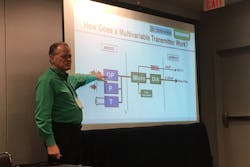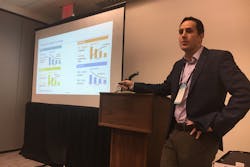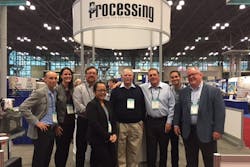The future of processing technology was on display to nearly 5,100 professionals in chemical process industries (CPI) who attended the 2017 Chem Show at the Javits Center in New York City, Oct. 31-Nov. 3. With a focus on evolution toward a more connected industry, the show hosted more than 275 exhibitors, along with plant managers, executives, engineers, equipment manufacturers and other industry personnel looking to learn and share new ways to optimize their plant operations.
"The theme of the show this year focused heavily on the evolution of the CPI," said Clay Stevens, manager of the Chem Show. "The world is quickly becoming more connected — we’re seeing how this is changing the way the industry operates, and how things like the Industrial Internet of Things (IIoT) and innovative new technologies are emerging to improve productivity, increase efficiency, cut costs, reduce waste and help companies be more sustainable."
The future of chemical processing
During the three-day event, exhibitors led 39 free "Best Practices and Technology Seminars" to provide answers to the practical challenges that chemical engineers and plant managers face every day, linking new technologies and solutions to products and services on the show floor.
Seminars covered a variety of trends and innovations such as: How to use interactive operations software to improve communication and information sharing plant-wide; reducing maintenance costs; optimizing workflow processes; improving overall efficiency with predictive modeling software; and implementing new technologies to improve plant safety, to name a few.
Here are a few key insights Processing gleaned from the seminar program:
Chemical processors embrace digitization
A connected chemical plant represents an entirely new way of business, according to Brian Zakrajsek, solution architect for Rockwell Automation. During his Chem Show presentation, Zakrajsek said 95 percent of chemical producers are going to make digitization investments in the coming year, with 50 percent indicating they are planning "radical, transformative" investments in digitization. Going forward, Zakrajsek said chemical companies expect to spend 5 percent of their overall revenue on digitalization. He said the aim of this investment is to upgrade aging assets for the modern age and eliminate the silos that have traditionally trapped potentially useful data in chemical plants.
Rockwell Automation’s Brian Zakrajsek, solutions architect, discussed how the IIoT, open networks, big data and analytics are going to transform the industry into a connected enterprise.
Unleashing the potential of industrial data
The rise of smart instrumentation has unleashed previously untapped data in industrial applications. This data is the foundation of what is commonly referred to as the Industrial Internet of Things (IIoT), and it represents an opportunity for significant cost savings for end-users, according to Todd Loudin, president of North American operations at FlowRox. During his presentation at the Chem Show, Loudin demonstrated the benefits of leveraging smart instrumentation to monitor the performance of valves and pumps. Loudin said the data that can be gleaned via modern smart systems enables users to gain immediate access to performance information that can be used to optimize system performance and minimize downtime.
‘Symptoms are easy to identify; causes are not’
Dominik Fry, business development engineer and Engineered Software, used this phrase during his Chem Show presentation, "Increase reliability and reduce energy costs with pump & piping analysis using flow modeling software," as he highlighted the rampant inefficiency of pumping systems across a range of industries. Citing a study of 1,600 pumps at 20 different plants, Fry said the average efficiency of pumps is less than 40 percent, with 10 percent of pumps operating at an efficiency of 10 percent or less. To address this issue, Fry said users must broaden their view beyond the pump and consider the system in which the pump is operating. "You can chase efficiency all you want, but you’re not going to solve your problem unless you fix the system," said Fry.
Chemical industry to pass $21B in spending this year
Trey Hamblet, vice president of research for Industrial Info Resources, presented a session on the outlook for spending in the chemical processing industry in the U.S. and Canada. Hamblet said 2017 kicked off with a record amount of spending planned for chemical industry construction projects. And with Hurricane Harvey downing more than 1,000 chemical production and process units, the industry is expecting to see more than $500 million in investment to rebuild and get plants back up and running as the year comes to an end, which figures to push 2017 chemical industry spending past the $21 billion mark.
Overcoming the challenges of modern instrument calibration
Flow measurement systems can be critical to control processes — from both efficiency and economic perspectives — particularly when custody transfer and billing are involved, according to Ned Espy, technical director for Beamex. During his Chem Show presentation, Espy explained why periodic flowmeter calibration to ensure instrument accuracy is crucial to the performance of many process plants and systems. However, he said, calibrating flow measurement systems in a flow laboratory can be logistically cumbersome and expensive. To help minimize the need for removing instruments from the system, Espy said users can now leverage modern technology to partially calibrate flowmeters in the field when calibration in a flow laboratory is not viable. He said, in-field calibration options are even available to support sophisticated multivariable instruments, which combine several process measurements (flow, pressure, temperature) within a single transmitter.
Ned Espy, technical director for Beamex. explained why periodic flowmeter calibration to ensure instrument accuracy is crucial to the performance of many process plants and systems during his Chem Show presentation.
Practical and tactical applications of IIoT
David Gustafson, global wireless applications business development manager for Emerson Automation Solutions, said chemical plants are losing an estimated $1 trillion per year running at suboptimal performance. During his Chem Show presentation, he cited a series of practical and tactical examples of how industrial wireless technology is enabling users to take a first step toward IIoT by optimizing the performance of systems through enhanced monitoring and, in some cases, even control. Gustafson said pumps, heat exchangers, steam traps, and cooling towers all represent logical options for wireless monitoring and control that can truly improve the efficiency of chemical plants and enable significant cost savings.
In his Chem Show presentation, David Gustafson, global wireless applications business development manager for Emerson Automation Solutions, said chemical plants are losing an estimated $1 trillion per year running at suboptimal performance.
Optimizing steam generation and condensate recovery
Donald Hite, business development manager, and Thomas Kemme, product manager, for Magnetrol International, offered up a presentation at Chem Show that highlighted the significant savings end users can achieve by optimizing steam processes. According to Hite and Kemme, 10 to 60 percent of energy consumed in the typical plant is related to steam production, much of which is due to inefficient operation of boilers. The presentation identified key areas in the steam generation cycle, condensate recovery system and waste heat recovery process where cost-effective instrumentation solutions offer tangible return on investment over the short term. Through the effective application of level and flow measurement, Hite and Kemme said users can reduce heat rate, environmental impact, fuel and water consumption, and water treatment and maintenance costs in commercial and heavy industries where steam generation is essential to the production of the process.
According to Tom Kemme, product manager for Magnetrol International, 10 to 60 percent of energy consumed in the typical plant is related to steam production, much of which is due to inefficient operation of boilers.
Industry trends in control valve automation
Control valve automation has made major advancements over the last several years as everyday valve manufacturers develop new features to meet industry requirements for automating and precisely positioning control valves. In his Chem Show presentation, Jim Braxton, regional sales manager for Badger Meter, discussed the importance of control valve automation and considerations for ensuring optimal performance. When it comes to choosing a device or technology to automate a valve, many factors come into play, such as specific application requirements, electric certifications, Safety Integrity Level (SIL), communication protocols versus traditional analog, and more.
Processing celebrates its 30th anniversary
The Chem Show was also the occasion for Processing magazine, a media sponsor of the event, to celebrate its 30th anniversary. As part of the Process Flow Network, Processing hosted a reception at its booth on Nov. 1 that attracted current advertisers, readers and former and current editorial and sales staff.
The Processing staff gathered to celebrate the magazines’s 30th anniversary at the 2017 Chem Show.
The next Chem Show will be held Nov. 19–21, 2019 at the Javits Center in New York City.





